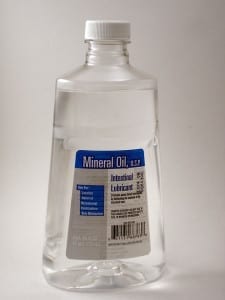78 year old female is receiving the following medications:
- Aspirin 81 mg daily
- Tramadol 50 mg twice daily
- Lisinopril 10 mg once daily
- Amlodipine 5 mg daily
- Losartan 25 mg daily
- Omeprazole 20 mg daily
- Ropinerol 0.25 mg daily
- Sinemet 25/100 three times daily
- Mineral Oil 15 mls po as needed
Two major considerations that I’m going to pick out here:
1. Mineral Oil is sometimes used orally for constipation. Mineral oil is used as a lubricant laxative. It is far from a first line laxative as it can increase risk of aspiration pneumonia. This is especially problematic in individuals who might have swallowing issues/difficulties. We don’t have a diagnosis list provided, but I would likely suspect a Parkinson’s diagnosis, and the patient is 78 years old as well and at risk of having swallowing complications. Another alternative here would certainly be appropriate. A stimulant and/or stool softener for prevention would be strong considerations depending upon frequency and severity of constipation.
2. The other potential concern that I would be looking to address is the use of losartan and lisinopril. Losartan and lisinopril don’t exactly work via the same mechanism of action, but work on the same pathway. Of course we’d like to dig into the history further, but they should likely not be used together in this case. Following blood pressure readings, we could possibly discontinue the losartan and increase the ACE Inhibitor or calcium channel blocker (amlodipine).
If you would like to add other possible considerations about the medication list, please feel to do so! If you are looking for more free clinical pharmacy content, check out the 30 medication mistakes! It is a FREE 6 page PDF I put together based upon my experiences as a clinical pharmacist.



also risk of hyperkalemia as result of combination of lisinopril and losartan
I realize this potential ADR is largely theoretical, but dogma would advises avoiding docusate concurrently with mineral oil. Great call on the ACEI/ARB combo; this was en vogue with nephrology for near-ESRD folks until this trial put that issue to rest: Fried LF, et al. Combined angiotensin inhibition for the treatment of diabetic nephropathy. N Engl J Med. 2013 Nov 14;369(20):1892-903. PMID: 24206457
Just to add to the rationale for a different choice in laxative, tramadol could be contributing to the constipation so senna and/or docusate would be more appropriate for potential opiate-induced constipation.
Heavy mineral oil should be the one to be used orally if needed. Light mineral oil should not be used orally and is used topically only. Heavy mineral oil is safer. Cases should be dealt with on individual basis. A Seventy-eight year old Parkinson’s patient is different than a thirty-year old otherwise healthy patient.
Also, Sinemet and Ropinerol both may be a cause for constipation. Senna laxatives are a great start. Stool softeners and fiber may help as well as Miralax. These can all be adjusted until desired effects. Occasional use of milk of magnesia might be a good choice, separated at a time different from omeprazole. Mineral oil is very much old school. There are many better choices.
I would say peg is the best option for long term..
I’m surprised that no one asked how long it has been since the last bowel movement. I always ask this first to avoid unnecessary or potentially damaging results. A day of missed bowels is not considered constipation to me. Likewise lack of a BM after a week with no gas is opposite cause for concern as giving a laxative may cause a perforation. These should always be the 1st question to consider.